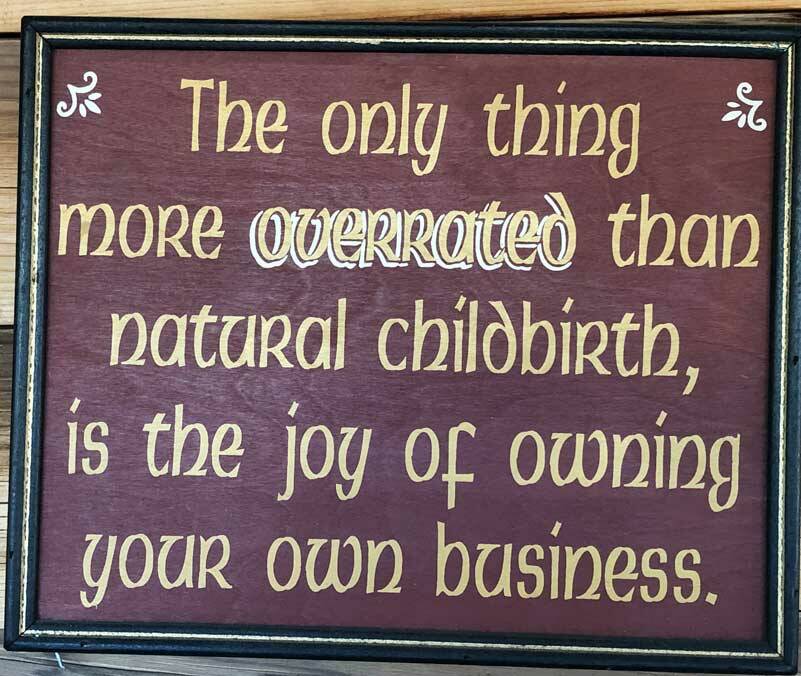By Morf Morford, Tacoma Daily Index
There’s an old saying in the entrepreneurial world; if you want to make a small fortune in business, start with a large one.
Starting your own business, like being a parent, is not for the faint-hearted. Besides the cost of doing business, a thousand decisions every day, an ever changing marketplace and the unforgiving, relentless, ever-shifting horizon of the bottom-line, you could come across strengths, potentials, pitfalls and frailties you may have never imagined. And that’s just what you might encounter in a typical day.
Failure, if not disaster, is always a looming possibility. But as many of us know all too well, failure is rarely final, and may, in fact, be the best teacher.
Learning: it’s not just for kids
For better or worse, we are not likely to forget the lessons learned from our own mess-ups; the bigger, the better.
One of the first principles of a successful life (by almost any standard) is to not make the same mistake twice.
Learning, like everything else it seems, has a very different “face” now. Once upon a time we had to “learn” things and possibly apply them in our lives and careers.
But now, many of us look online for “how to do” almost anything.
We don’t need to know, or learn, anything. We trust the video or website, and we try it and forget within minutes.
Learning is, or at least should be, cumulative and relational. Real learning should change who we are – and literally make us different, more capable and more confident people. Learning at its best, is, by necessity, unsettling; you learn and absorb, and maybe even use, what you didn’t know before.
There are no secrets to success. It is the result of preparation, hard work and learning from failure.— Colin Powell
Or, as I used to say to my students, if you are not failing, you are not trying hard enough. You won’t get anything right, from making an omelet to skiing, the first time you do it.
I failed my way to success.— Thomas Edison
The way things “have always been done” may have worked well for a long time. And almost any new process or procedure was almost certainly revolutionary when it was first considered. Or introduced. But no matter how well it worked under previous circumstances doesn’t mean it will flex and fit developing demands. Or the current situation.
Whether something worked before does not mean it will work now. But it also doesn’t mean that it won’t work. What matters is whether it works at all.
The “old ways” are there, for better or worse, as a foundation for whatever comes next.
The secret of change is to focus all your energy not on fighting the old but on building the new.— Socrates
You won’t learn anything from someone who already (or even almost reflexively) agrees with you. It might not be a pleasant experience, but learning from those who disagree with you might be what you need most.
Your most unhappy customers are your greatest source of learning. — Bill Gates
You can’t please everyone. And the ones you don’t please just might be your best teachers. After all, as every aspiring writer or artist (especially a child) knows, don’t expect helpful criticism from mom – she’ll like it no matter what it looks like.
You can’t learn anything from someone who already agrees with you.
Whether they automatically love what you do, or hate it, people who are too close to you are of little practical assistance when it comes to leaning into new territory that, sometimes, only you can see.
The No. 1 reason people fail in life is because they listen to their friends, family and neighbors.— Napoleon Hill
The greater the artist, the greater the doubt. Perfect confidence is granted to the less talented as a consolation prize.— Robert Hughes
The greatest artist, and the most resourceful entrepreneur, is the one who is always willing to learn and adapt to shifting demands and circumstances.
Failure is never final. But neither is success.
Responding to an ever-shifting market and economy is the first order of business in any industry or field.
If you’ve ever worked with anyone who “knows it all”, you know that what they really mean is that, for them apparently, all learning has stopped. Their “confidence” is in the past. And they are increasingly unprepared for the future.
How do we measure success?
When it comes to success, the usual popularly acceptable accouterments of success often quickly become tiresome.
A sense of a job well done is of far more value, and of far more enduring worth than any profitable quarterly report.
In short, if you like what you do so much that you’d do it without getting paid for it, you have found your true calling.
You know you are on the road to success if you would do your job, and not be paid for it.— Oprah Winfrey





